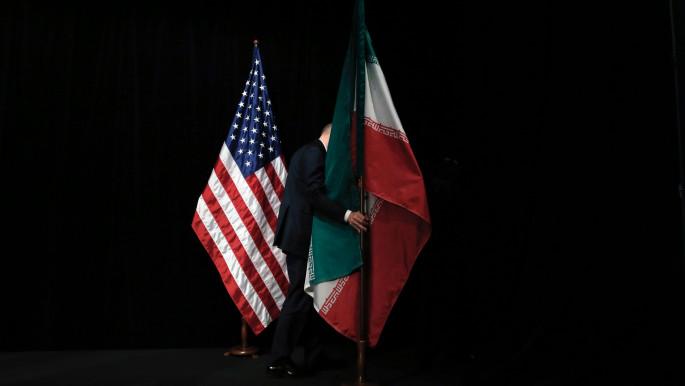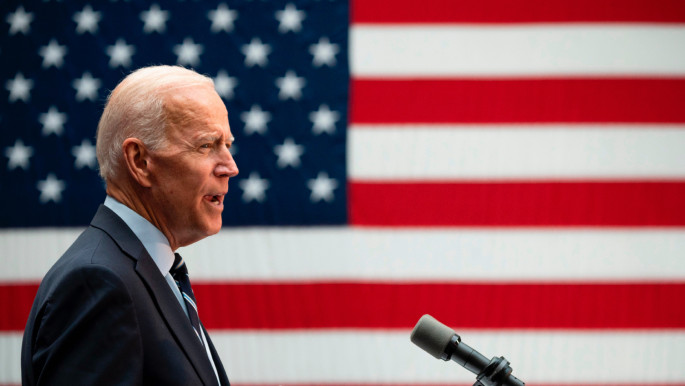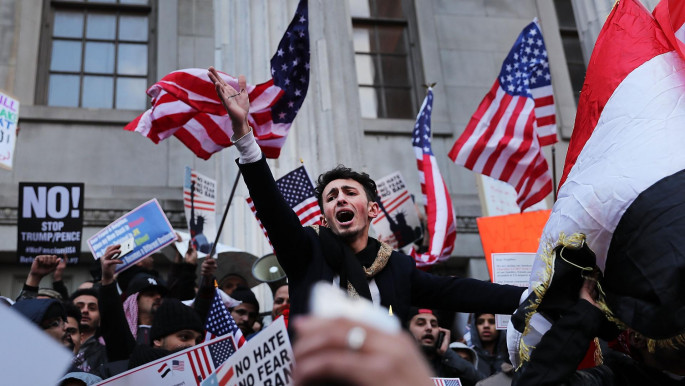Biden and the Saudi quagmire in Yemen
Engulfed in a civil war since 2014 which internationalised the following year with the ongoing Saudi-led military campaign, Yemen is where the Saudis have used many of their arms purchased from the US.
Although we do not yet know if former Vice President (VP) Joe Biden will win - let alone implement policies consistent with his campaign rhetoric - his presidency could possibly help push the actors in Yemen's conflict toward diplomacy.
Throughout Biden's campaign, he has spoken about the Yemen war in ways that contrast him from President Donald Trump. As a candidate, the former VP vows to end Washington's support for the Saudi-led war.
Meanwhile, the Trump administration is only doubling down on its policies of backing Riyadh against the Houthi rebels by heavily arming the oil-rich kingdom and providing strong diplomatic cover. The Saudi-US Strategic Dialogue, held on 14 October, most recently confirmed this point.
Since early on in Trump's presidency, he has made the US-Saudi partnership a hallmark of his administration's Middle East foreign policy. Saudi Arabia was the first foreign country which he officially visited as president.
 |
Trump has made the US-Saudi partnership a hallmark of his administration's Middle East foreign policy |
 |
That spoke volumes of Trump's desire to strengthen Washington-Riyadh relations following the eight years of Obama's presidency, which harmed the US-Saudi partnership. Moreover, Trump and Crown Prince Mohammed bin Salman (MBS)'s personal bond has served to significantly boost bilateral ties notwithstanding the problems which MBS faces with lawmakers in DC.
Throughout Trump's time in office, he has constantly emphasised what he sees as the importance of continued US arms sales to Riyadh. As the president likes to put it, these sales create "jobs, jobs, jobs". Also, the Trump administration has framed the US role in Yemen's crisis in relation to Iran. The narrative is that pushing back against Tehran's "malign" behaviour requires supporting the Saudis in Yemen. With the Trump administration mulling a terrorist designation for the Houthi rebels, the pro-Saudi stance of this administration on Yemen could not be clearer.
 |
|
| Read more: Could Biden bring the US back into the Iran nuclear deal? |
What Biden has been laying out on the campaign trail is an idea for a fundamentally new approach to the Yemeni conflict. Against the backdrop of the murder of Jamal Khashoggi, the exacerbation of Yemen's humanitarian disasters, the abuse of female activists within the kingdom and other issues, there have been growing calls from US lawmakers to revisit the US-Saudi relationship.
As a candidate, Biden's rhetoric indicates that he hears these voices loud and clear. "Under a Biden-Harris administration, we will reassess our relationship with the kingdom, end US support for Saudi Arabia's war in Yemen and make sure America does not check its values at the door to sell arms or buy oil," said the former VP. "America's commitment to democratic values and human rights will be a priority, even with our closest security partners."
As a presidential hopeful, Biden has been distancing himself from the Obama administration's record on Yemen. It seems that Biden believes that only a diplomatic (not a military) solution can solve the Yemeni crisis. Under a Biden administration, the US in coordination with other international actors (the European Union, United Kingdom, Canada, Russia, China, Oman, Kuwait, etc.) would have substantial leverage over Saudi Arabia that could be used to push the multifaceted conflict toward a diplomatic settlement that involves compromises from all actors in the war.
"Biden would work more closely with the UN initiative and would exercise pressure on the kingdom to accept a more comprehensive and inclusive political solution in Yemen, which would see the Houthis playing a greater role in any political solution," Andreas Krieg, Assistant Professor at King's College London's School of Security Studies, told The New Arab.
 |
There is a growing bipartisan consensus in America about the need to detach the US from Saudi Arabia and end participation in Yemen's war |  |
For a Biden administration to work with various actors - including friends and foes - in pursuit of a political solution in Yemen, the US will need to engage not only the major military actors in the fighting (Saudi Arabia, Yemen's UN-recognised government, the Houthis, the Southern Transitional Council, Iran, etc.) but also various civil society organisations which will inevitably impact the war-torn country's future.
Bringing peace, stability, and security back to Yemen will also require the international community to help the country cope with its nightmarish Covid-19 crisis - a pandemic which the conflict has made nearly impossible for Yemenis to sufficiently contain.
Given the extent to which the Yemen war has become unpopular on both sides of DC's partisan divide, some foreign policy analysts, including Samuel Ramani, a doctoral researcher of International Relations at Oxford University, believe that Biden is serious when he says he plans on withdrawing the US from Yemen.
"There is a growing bipartisan consensus in the United States, which includes prominent Republicans such as Senator Lindsey Graham, about the need to detach the United States from Saudi Arabia and end participation in Yemen," Ramani told The New Arab.
 |
|
| Read more: What a Biden presidency could mean for the Middle East |
"Bernie Sanders has made ending the Yemen war an important cause for his foreign policy agenda, so Biden would view a change in US policy on Yemen as an olive branch to the progressive left and Sanders supporters. Trump's cabinet has often been the last line of defence for the Saudi war in Yemen, so with Trump out of office, Saudi Arabia loses that lifeline."
But other experts are sceptical that Biden would move too far away from 'business as usual' in Washington-Riyadh relations. The reason is that arms sales are such a central and lucrative part of bilateral affairs.
"I could see exactly why Biden would say these things during a primary season and during the campaign, but as president I think it is very unlikely," said Michael Stephens, an associate fellow at the London-based Royal United Services Institute. "Would you want to be the first president to break that nexus of jobs and industry which is so closely related to the home market?"
To be sure, Biden would not want to wholly abandon the US-Saudi partnership. As president, Biden would need to work with the kingdom on a host of international files that matter to both Washington and Riyadh. The chances are good that a Biden administration would want to continue pressuring Iran to change its conduct in the region while also trying to push more Arab states toward formalizing diplomatic relations with Israel - two endeavours where a Biden White House would welcome and benefit from Saudi support.
 |
Trump's cabinet has often been the last line of defence for the Saudi war in Yemen, so with Trump out of office, Saudi Arabia loses that lifeline |  |
At bare minimum, with Biden at the helm there would probably be some gestures from the executive branch that give the Saudis the cold shoulder, such as Biden and high-ranking officials in his administration not visiting the kingdom - at least not as often as those in Trump's.
Also, regarding congressional action against MBS - either in relation to the Khashoggi affair or the Yemeni conflict - Biden would probably not bend over backwards to fortress the Saudi crown prince from accountability from US lawmakers, as Trump has constantly done.
How Biden and his inner circle decide to approach Iran could easily impact his administration's policies vis-à-vis Yemen. "The main variable, however, is whether Biden swiftly resumes dialogue with Iran, and this results in a revival of the Joint Comprehensive Plan of Action or a fresh nuclear agreement and sanctions relief," argued Ramani.
 |
|
| Read more: How a future Biden White House can end the war in Yemen |
"In the event of a new Iran deal, Saudi Arabia and the UAE will be restive, and Biden could pacify discontent in the Gulf by slowing his withdrawal of US support for the Yemen war. Alternatively, if the end of the Iran arms embargo and movement of an ambassador to Sana'a results in more sophisticated arms transfers to the Houthis, which strike Saudi oil facilities, then Biden could be under pressure to delay the US withdrawal from Yemen."
Ultimately, it is too early to know if a Biden presidency would lead to changes in US foreign policy which are consistent with the former VP's rhetoric about values, human rights, and reassessing Washington's relationship with the Saudi kingdom. Nonetheless, it is fair to point out that the only hope for an end to US support for Saudi Arabia's war in Yemen comes from a possible Biden victory in 7 days.
If Biden takes the helm in January, his presidency has the potential to open up a new set of circumstances resulting from the US ceasing to support the Saudis in a conflict that has fuelled the world's worst humanitarian crisis.
Giorgio Cafiero is the CEO of Gulf State Analytics, a Washington, DC-based geopolitical risk consultancy.
Follow him on Twitter: @GiorgioCafiero
Monica Leung is an intern at Gulf State Analytics.



